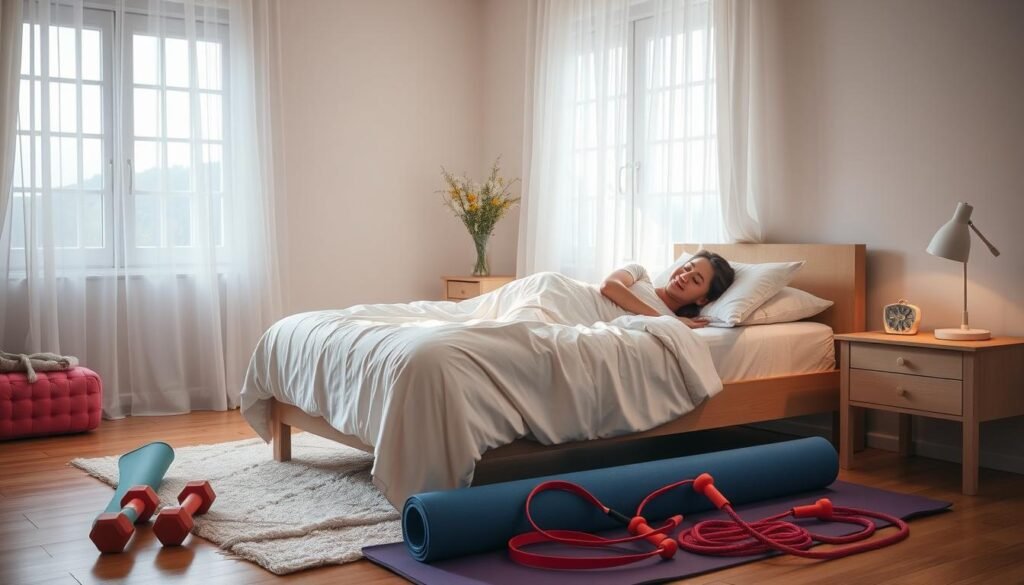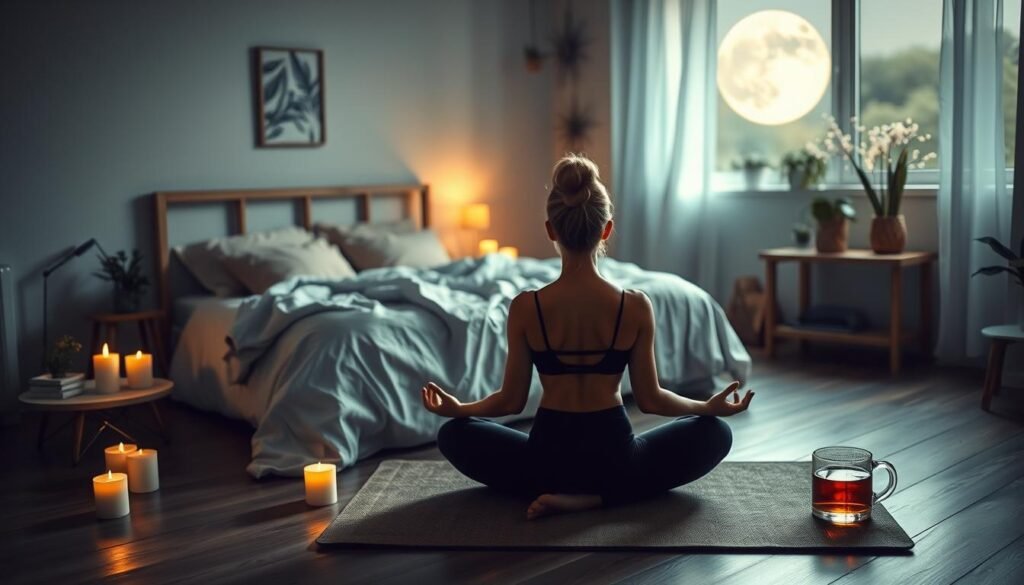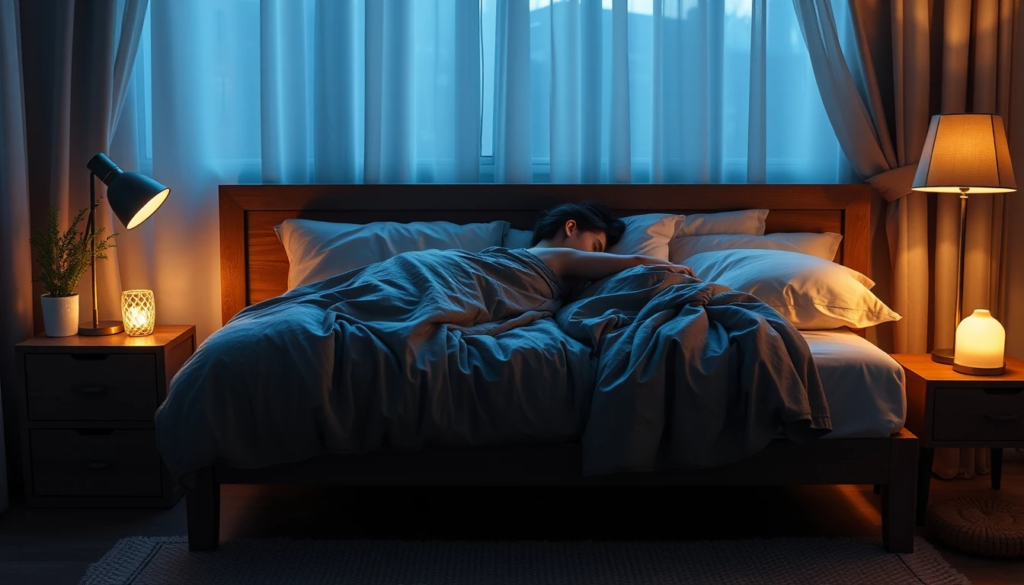Did you know that over two-thirds of people have struggled with poor sleep for months or years? Your sleep health is key to your overall wellness. It affects your physical and mental performance.
Sleep is more than just resting. It’s a complex process that’s vital for your mental health and wellness. Your sleep routine can boost your energy, brain function, and mood.
Learning about sleep health tips is not just helpful—it’s vital for your health. Quality sleep can lower disease risks and improve your mental clarity. It’s your body’s natural way to reset.
Key Takeaways
- Poor sleep affects more than two-thirds of adults
- Sleep is critical for physical and mental health
- Quality sleep reduces risk of chronic health conditions
- Sleep impacts cognitive function and emotional well-being
- Implementing sleep strategies can transform your overall health
Understanding the Importance of Quality Sleep for Overall Wellness
Sleep is key to a healthy life, affecting both body and mind. Most adults need at least seven hours of sleep each night. This helps keep them healthy and performing well.
Looking into the sleep and wellness link shows us how rest shapes our days. Our body’s internal clock, or circadian rhythms, controls our sleep and health.
How Sleep Affects Physical Health
- Supports immune system function
- Regulates metabolism and hormone production
- Reduces risk of cardiovascular events
- Facilitates tissue repair and growth
“Sleep is the golden chain that binds health and our bodies together.” – Unknown
Impact on Mental Well-being
Not getting enough sleep can hurt your mental health. It can lead to:
- Increased risk of anxiety
- Higher likelihood of depression
- Reduced emotional regulation
- Decreased cognitive function
Connection to Daily Performance
| Sleep Duration | Performance Impact |
|---|---|
| Less than 5 hours | Significant cognitive decline |
| 5-6 hours | Reduced accuracy and decision-making |
| 7-9 hours | Optimal cognitive performance |
Prioritizing sleep is not a luxury—it’s a necessity for maintaining a balanced and productive lifestyle.
Creating the Perfect Sleep Environment
Your sleep environment is key to getting good rest. Making your bedroom the perfect place to sleep can really help. It boosts your sleep quality and keeps your sleep habits healthy.
To make a sleep sanctuary, think about what affects your sleep. This includes things like light, noise, and temperature.
Optimal Room Temperature Settings
Temperature is very important for sleep. Studies say the best bedroom temperature is between 60-67°F (15-19°C). A cooler room tells your body it’s time to sleep.
- Keep room temperature consistent
- Use breathable bedding
- Adjust thermostat before bedtime
Lighting and Sound Control
Light and noise can mess up your sleep. By controlling these, you can make your bedroom a quiet, dark place.
| Light Control Methods | Sound Reduction Techniques |
|---|---|
| Blackout curtains | White noise machines |
| Eye masks | Earplugs |
| Dimmer switches | Soundproofing materials |
Choosing the Right Bedding
Your bedding choices affect how comfortable and restful your sleep is. Choose materials that keep you cool and dry.
“The right bedding can transform your sleep experience from restless to rejuvenating.” – Sleep Experts
- Select moisture-wicking fabrics
- Choose mattresses supporting proper spinal alignment
- Use pillows matching your sleeping position
Designing your sleep space carefully sets you up for better sleep. This helps your overall health and well-being.
Establishing a Consistent Sleep Schedule
Your body likes things to be the same every day. This is why making your sleep schedule consistent is so important. Studies show that people who stick to a regular sleep schedule have 20% fewer sleep problems.
“Consistency is the cornerstone of excellent sleep health.” – Sleep Science Research Institute
Having a set sleep schedule helps your body’s internal clock stay in sync. Adults need 7 to 9 hours of sleep each night for the best rest. Always go to bed and wake up at the same time, even on weekends.
- Select a consistent wake-up time
- Maintain the same bedtime every night
- Gradually adjust sleep times if needed
- Create pre-sleep relaxation rituals
Experts say to make changes slowly. If you’re changing your sleep schedule, do it by 15-minute steps. This helps your body adjust without feeling too jumpy.
| Sleep Schedule Strategy | Potential Benefits |
|---|---|
| Consistent Wake Time | 20% Reduction in Sleep Issues |
| Regular Bedtime Routine | Improved Circadian Rhythm |
| Gradual Time Adjustments | Smoother Biological Adaptation |
By focusing on a regular sleep schedule, you’ll sleep better, feel more alert during the day, and live a healthier life.
Sleep health tips Mental health fitness Holistic wellness Health benefits
Understanding the link between sleep and wellness can change your health journey. Sleep is more than just rest—it’s key for mental health and wellness.
Your mental and physical health are linked to sleep quality. Studies show people with insomnia are ten times more likely to get depression than those who sleep well.
Natural Sleep Enhancement Methods
Try powerful meditation techniques to better your sleep:
- Mindfulness meditation
- Deep breathing exercises
- Progressive muscle relaxation
- Guided imagery
Mind-Body Connection
Fasting and meditation can greatly affect your sleep. These practices help balance your mental and physical states.
Sleep is the golden chain that binds health and our bodies together. – Thomas Dekker
Wellness Integration Strategies
| Strategy | Impact on Sleep |
|---|---|
| Meditation | Reduces stress, improves sleep quality |
| Intermittent Fasting | Regulates circadian rhythms |
| Regular Exercise | Enhances sleep duration and depth |
Your path to better sleep is unique. Try different methods to find what works best for you.
Dietary Considerations for Better Sleep
Your diet is key to good sleep. Eating right can help you sleep better. What and when you eat affects your sleep.
“Food is not just fuel, it’s information that tells your body how to function.” – Dr. Mark Hyman
Here are some diet tips for better sleep:
- Avoid heavy meals within 2-3 hours of bedtime
- Choose foods rich in tryptophan and melatonin
- Limit caffeine intake after 2 PM
- Stay hydrated but reduce liquid consumption before sleeping
Easy diets for better sleep include:
- Mediterranean-style eating patterns
- Balanced nutrition with whole grains
- Lean proteins
- Plenty of fruits and vegetables
Some sleep-friendly foods are:
- Almonds – rich in magnesium
- Kiwi – contains serotonin
- Chamomile tea – promotes relaxation
- Fatty fish – high in vitamin D
By following these tips, you can make a diet that helps you sleep well. Remember, sticking to healthy habits is important for good sleep.
The Role of Exercise in Sleep Quality
Being physically fit is key to better sleep and health. Regular workouts can change your sleep for the better, making nights more restful.

It’s important to understand how exercise affects sleep. The right timing, intensity, and type of activity matter. Experts say 150 minutes of moderate to vigorous exercise a week is best for sleep.
Best Times for Physical Activity
When you exercise can affect your sleep. Here are some tips for the best workout times:
- Morning or afternoon workouts are ideal for promoting better sleep
- Avoid intense exercise within 2-3 hours of bedtime
- Light stretching or yoga can be beneficial in the evening
Types of Exercise for Better Sleep
Not all exercises are the same for sleep. Weight loss tips often suggest various activities for better rest:
- Aerobic exercises like walking or swimming
- Strength training
- Yoga and relaxation techniques
- Low-impact activities
Post-workout Recovery and Sleep
Your diet and exercise plan affect recovery and sleep. Regular physical activity can reduce the risk of sleep problems such as insomnia and sleep apnea.
Research shows that just 15 minutes of running or an hour of walking can significantly improve sleep patterns and reduce the risk of major sleep disruptions.
Adding consistent exercise to your life can lead to better sleep, more fitness, and overall health.
Managing Digital Device Usage for Improved Sleep
In today’s world, digital devices can block quality sleep. Almost 15% of adults find it hard to fall asleep, and too much screen time is a big problem. How you use digital devices affects your sleep and mental focus.
Smartphones, tablets, and laptops give off blue light. This light messes with your body’s melatonin, making it hard to relax and sleep well.
“Technology should improve our lives, not compromise our health.” – Sleep Health Expert
- Implement a digital curfew 1-2 hours before bedtime
- Use blue light filtering apps or screen settings
- Create a tech-free bedroom environment
- Practice the 20-20-20 rule to reduce eye strain
For a healthy life, try relaxing activities like reading, meditation, or stretching. These can help you stop using digital devices and get ready for sleep.
Less screen time can make your sleep better and improve your health. Being smart about digital use boosts your mind and helps your body sleep right.
Natural Supplements and Sleep Aids
Over 60 million Americans face sleep challenges. Natural remedies are key to holistic wellness. They can greatly improve your sleep and health.
Looking for natural supplements to help with sleep? They support your body’s sleep cycle. Knowing about them can guide your choice for better rest.
Melatonin: Your Sleep Hormone Ally
Melatonin is vital for sleep. It’s made in the brain before sleep. Taking it can enhance sleep quality. Studies show the best doses are 3-10 mg.
- Helps reset your natural sleep cycle
- Can reduce time needed to fall asleep
- Supports overall sleep quality
Herbal Remedies for Restful Nights
| Herb | Sleep Benefits | Recommended Dosage |
|---|---|---|
| Valerian Root | Improves sleep quality | 530 mg nightly |
| Magnesium | Reduces time to fall asleep | 225-729 mg daily |
| Lavender | Enhances sleep in older adults | Aromatherapy |
“Natural supplements can be powerful allies in your quest for better sleep” – Sleep Research Institute
Always talk to a healthcare professional before starting any new supplement. This ensures they are safe and work well for you.
Stress Management Techniques for Better Sleep

Stress can make it hard to sleep well. Almost 63% of adults struggle with stress. It’s important to learn how to manage stress for better mental health and well-being.
Mindfulness practices can change how you sleep. Studies show meditation can cut anxiety and stress by up to 30%. This can make your sleep much better.
“Stress is not what happens to you, but how you react to it.” – Hans Selye
- Practice daily journaling to offload worries before bedtime
- Engage in meditation for 15-20 minutes daily
- Use progressive muscle relaxation exercises
- Create a consistent evening wind-down routine
How you manage stress affects your sleep. Try these tips:
- Set clear boundaries between work and personal time
- Practice gratitude meditation
- Limit digital exposure before bedtime
- Connect with supportive friends and family
Managing stress is a skill you can learn. By adding mindfulness to your daily life, you’ll sleep better and feel mentally healthier.
Understanding and Avoiding Sleep Disruptors
Sleep health is a delicate balance. It can be easily interrupted by various factors. Recognizing and addressing these disruptors is key for maintaining optimal sleep and lifestyle habits.
Many unexpected sources can disrupt your sleep. Knowing these sources is the first step to a better night’s rest.
Common Sleep Interruption Causes
- Caffeine and nicotine consumption
- Alcohol intake before bedtime
- Electronic device usage
- Irregular work schedules
- Stress and anxiety
Substance-Related Sleep Disruptors
| Substance | Sleep Impact | Recommended Action |
|---|---|---|
| Caffeine | Reduces sleep quality | Avoid 6 hours before bedtime |
| Alcohol | Disrupts sleep cycles | Limit intake, specially before sleep |
| Nicotine | Stimulates nervous system | Eliminate or significantly reduce |
Solutions for Sleep Disturbances
Creating a consistent sleep environment is key. Consider these sleep health tips:
- Establish a regular sleep schedule
- Create a calm, dark bedroom environment
- Limit screen time before bed
- Practice relaxation techniques
“Sleep is the golden chain that binds health and our bodies together.” – Thomas Dekker
By understanding and mitigating sleep disruptors, you can improve your sleep quality. This supports your body’s natural rhythm.
Creating a Relaxing Bedtime Routine
Creating a bedtime routine is key for better sleep and mental health. Your evening routine greatly affects your sleep quality and health.
“A peaceful evening prepares the mind and body for restful sleep.” – Sleep Wellness Institute
Here are some relaxation techniques for your bedtime routine:
- Practice gentle stretching for 10-15 minutes
- Take a warm bath or shower 90 minutes before bedtime
- Engage in light reading or journaling
- Practice deep breathing or meditation
The 321 method helps create a calm sleep environment:
- 3 hours before bed: Finish intense activities
- 2 hours before bed: Avoid stimulating digital content
- 1 hour before bed: Focus on relaxation
| Activity | Duration | Benefit |
|---|---|---|
| Deep Breathing | 10 minutes | Reduces stress, promotes relaxation |
| Warm Bath | 20 minutes | Lowers core body temperature, induces sleepiness |
| Light Reading | 30 minutes | Calms mind, reduces screen time |
Remember, the key to an effective bedtime routine is consistency and personalization. Try different relaxation techniques to find what works best for you.
Studies show 63% of people find bedtime routines helpful for mental health. By taking time to relax and practicing these strategies, you can improve your sleep and overall well-being.
Conclusion
Your journey to better sleep is key to holistic wellness. The tips we’ve shared show how sleep and health are closely linked. Mental health isn’t just about stress; it’s about a full health approach.
Changing your sleep habits takes time and effort. Every small step can lead to big improvements in energy and mood. By focusing on sleep, you’re investing in your health for the long run.
Most people face sleep issues sometimes. If you always have trouble sleeping, talk to a doctor. They can offer advice that fits your needs. Keep working on your wellness goals, and you’ll see big changes in your life.
Quality sleep is essential, not a luxury. By using the tips from this article, you can improve your sleep. This will help your body, mind, and spirit stay healthy.
FAQ
How many hours of sleep do I really need each night?
Can diet really impact my sleep quality?
How does exercise influence my sleep patterns?
What are the best ways to create an ideal sleep environment?
How can I manage digital device usage to improve my sleep?
Are natural sleep supplements safe to use?
How does stress impact my sleep, and what can I do about it?
What are common factors that disrupt sleep?
Can improving my sleep really benefit my overall health?
How long does it take to establish a new sleep routine?





You made some good points there. I did a search on the topic and found most people will approve with your site.